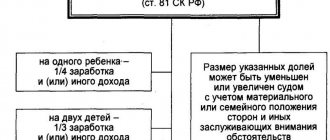According to current legislation, parents are required to support their children who have not reached the age of majority. That is why, in the event of a divorce, the father (mother) leaving the family is obliged to pay alimony. This article will help you figure out how to collect such a payment and what is required for this.
Features and regulatory regulation of the collection of child support
In paragraph 1 of Art. 80 of the RF IC stipulates the obligation of parents to support their children under 18 years of age. It applies to both mother and father. Therefore, in the event of a divorce, the spouse who begins to live separately is obliged to pay alimony.
REFERENCE. The main regulatory document regulating the procedure for calculating and collecting such payments is the RF IC. We are mainly talking about Chapter 13, which outlines the responsibilities of parents for maintaining a common child, the amount of such payments, the types of earnings from which they can be withheld, and other key conditions.
The process of collecting child support for a common child has the following key features:
- the provision of such financial assistance is an obligation from which it is impossible to escape;
- parents have the right to independently agree on the form and procedure for paying child support;
- collection of financial support for a child can be carried out by agreement of the parties or in court;
- Deprivation of parental rights is not a basis for exemption from paying child support.
From what income can alimony be withheld, and from which not?
Alimony can only be withheld from the official income of the payer, namely:
- wage;
- payment for rent of real estate (if a lease agreement has been drawn up and registered);
- scholarship, pension (except survivor's pension);
- dividends on shares;
- income from business activities;
- income from the sale of copyrights;
- funds that are paid by court decision as material or moral damage.
Income that cannot be documented will not be taken into account during the trial.
The list of income that cannot be levied is enshrined in Art. 101 Federal Law “On Enforcement Proceedings”.
Peaceful resolution of the issue of payment of child support - procedure
Current legislation does not prohibit resolving the issue of providing financial assistance to a child in a peaceful manner.
If it was decided to reach an agreement without court, then the parents must enter into an agreement between themselves on the payment of child support. The procedure for carrying out such a procedure is regulated by the provisions of Chapter 16 of the RF IC.
This document is an official agreement that defines such key conditions as the amount of payments for a common child, the conditions for their calculation and the procedure for their provision. There are two parties involved here:
- a person who is responsible for financial support of a minor;
- the recipient of these funds in the person of the child's legal representative (in this case it may be the mother or father, guardian, adoptive parent).
The process of concluding an agreement on the payment of child support for common children includes the following main stages:
- Preparing the document itself - you can do this yourself or contact a competent specialist. It is preferable to choose the latter option.
- Collecting the necessary papers that will be required from the notary.
- A visit to the notary's office to certify the agreement signed by both parties.
The agreement on the payment of alimony has the force of a writ of execution, therefore, if the other party fails to comply with its terms, the recipient of the funds can initiate enforcement proceedings.
What documents will be required?
To notarize an agreement to pay child support for a common child, applicants must collect the following documents:
- passports of both parties, that is, father and mother;
- certificate of birth of a common child;
- draft agreement on payment of maintenance for a minor;
- documents confirming the income received by the alimony payer during the last 3 months (for example, a bank account statement, a certificate from the workplace);
- payment details to which the money will be transferred.
ATTENTION! Concluding an agreement is a paid procedure. It includes the following main expense items: payment of the state fee for notarization of the document and payment for the services of a specialist who drafted the text of the agreement (if the parents asked for outside help).
The procedure for preparing an agreement on the payment of alimony
At the legislative level, a unified form of agreement on the payment of alimony has not been approved. However, it should include the following key sections:
- Information about the place and time of concluding such an agreement, personal data of both parties (full names of parents, passport details, information about registration and place of residence).
- Subject of the agreement - this section indicates that the payer undertakes to pay financial assistance for a common child. This also includes information about the recipient of the funds and the amount of the salary.
- Form of alimony payment and terms - this specifies how the payment will be made (for example, a fixed payment, a percentage of wages, etc.), as well as the exact date of each month when remittances should be received.
- Rights and obligations of both parties to the agreement.
- The period of time during which a document remains in force.
At the very end of the agreement there must be a signature of the payer and the recipient of payments for a common child.
Do I need to get it certified by a notary?
Yes, this is a mandatory condition, which is enshrined in paragraph 1 of Art. 100 IC RF. In case of non-compliance, such a transaction will be considered void. This conclusion follows from paragraph 3 of Art. 163 Civil Code of the Russian Federation.
Collection of alimony through court
If the issue of paying child support cannot be resolved peacefully, then the only way out is to go to court. This is written in paragraph 2 of Art. 80 IC RF.
The following categories of persons have the right to file a claim in court for the recovery of alimony:
- the second parent with whom the child remains to live;
- guardian (adoptive parent) of the baby;
- guardianship and trusteeship authorities.
The judicial procedure for collecting child support payments can be carried out through a claim or an order. In the latter case, the process is implemented according to a simplified scheme.
Claim procedure
The claim procedure refers to the classic version of collecting child support. In this case, Chapters 12-22.3 of the Code of Civil Procedure of the Russian Federation come into force.
The key feature of litigation is that it is used in cases where there are disputes between parents regarding:
- the amount and procedure for payment of alimony;
- establishing paternity;
- other types of disagreements.
The process of collecting child support through a claim includes the following steps:
- Choosing a judicial authority to file a claim - if the question concerns only the collection of alimony, then you need to contact a magistrate. If there is a need to establish paternity, then the claim should be filed in the district court.
- Preparation of a statement of claim - the rules for drawing up such a document are described in Art. 131 Code of Civil Procedure of the Russian Federation. The content of a claim for alimony must include the following information:
- the name of the court to which the application is filed;
- information about the plaintiff and defendant;
- description of the circumstances (this indicates who the participants in the proceedings are for the minor, with whom the child lives, etc.);
- expression of demands in relation to the defendant, indicating the type of payment, form of recovery, desired amount;
- information about attempts made to resolve the issue peacefully.
IMPORTANT! It is better to entrust the preparation of a statement of claim for alimony to an experienced lawyer. In this case, it is possible to take into account the features of a specific situation as much as possible in the document.
- Collection of documents - they will go as attachments to the claim. This includes:
- a receipt confirming payment of the state duty;
- power of attorney for the representative of the plaintiff (if necessary);
- baby's birth certificate;
- certificate of divorce from the defendant;
- a document confirming paternity (if the parents were not officially married);
- paper confirming attempts made to resolve the issue of alimony in pre-trial order.
- Once the complete package of documents has been prepared, it must be delivered to the court in any convenient way (for example, a personal visit, by registered mail, through a representative, etc.).
- Waiting for a summons to a meeting, taking part in court proceedings and receiving a ready-made decision on the calculation of alimony.
It can take up to 2 months to collect alimony through a lawsuit, and if additional circumstances and disputes are identified, this period can increase up to a year.
Order procedure (simplified procedure)
The writ procedure means a simplified procedure for collecting financial support for a child. It is characterized by the following features:
- after considering the case, the court issues a court order;
- faster decision-making time;
- reduced state duty;
- the parties do not take part in the process.
ATTENTION! To use this option, the following condition must be met (Part 5 of Article 122 of the Code of Civil Procedure of the Russian Federation) - the requirement to pay alimony should not relate to establishing or challenging paternity, and should not involve the involvement of other interested parties in the process.
To resolve the issue of paying maintenance for a minor by order, the following papers will be required:
- application for an order;
- receipt of payment of the duty;
- birth certificate of the baby (it must contain a note about the father and mother);
- a certificate of family composition, which shows that the child lives with the claimant;
- document on divorce;
- power of attorney for a representative.
Depending on the circumstances, other documents may be required. Consideration of an application for the calculation of alimony by order includes two stages:
- Initial acceptance of the document (return or refusal to consider) - if a positive decision is made, the court will make an appropriate determination.
- Issuance of a court order containing information about the established procedure for paying alimony and the amount of such transfers.
The general period for making a decision on calculating alimony by order is 5 days from the date of filing the application.
Payment of state duty
When collecting alimony through the court, the plaintiff will have to pay a state fee. Its size depends on the way this process is organized:
- Claim procedure - the amount of state duty will be 150 rubles. If a claim for payment of monetary support is included in the claim in favor of the plaintiff himself, the fee will double and amount to 300 rubles. Conclusion from paragraphs. 14 clause 1 art. 333.19 Tax Code of the Russian Federation.
- Mandatory procedure - the duty will be less by 50% (clause 2 of Article 123 of the Code of Civil Procedure of the Russian Federation).
Special cases
Sometimes in practice there are special cases when the marriage between the child’s parents was not registered or the child has reached the age of majority. In such situations, the question arises of how to properly formalize the procedure.
Marriage not registered
If the mother and father were not in a legal relationship, then the process of collecting child support may have the following features:
- before going to court for alimony, the fact of paternity must be legally established (if there is no record of the father on the child’s birth certificate);
- the claim to establish paternity can also include a requirement to accrue financial support for the child;
- if the father is indicated on the birth certificate, then the issue of alimony can be resolved in the general manner (through claim or writ proceedings), the only difference will be that you do not need to attach a document confirming the dissolution (conclusion) of the marriage to the application.
Children have reached adulthood
By law, the obligation to make child support payments ends when the child reaches the age of majority (18 years old). However, in some cases, the payer must pay child support even after the child reaches this age.
In accordance with paragraph 1 of Art. 85 of the RF IC, parents are obliged to continue to support adult children who cannot take care of themselves. We are talking about disabled persons over 18 years of age.
In such a situation, the father (mother), who is dependent on such a child, has the right, through an agreement or in court, to demand the payment of alimony from the second parent. You will need to additionally attach documents to your application confirming the child’s inability to take care of himself.
Basic information
Basically, child support obligations are established in relation to minor children whose parents divorced and began to live separately. Also, alimony is transferred to children who have reached the age of 18, for example, if they are unable to work and have a disability.
Alimony can be established for a spouse. A needy person has the right to financial support both during marriage and after its dissolution. Alimony can be established:
- disabled spouse;
- for the spouse until their common child is 3 years old or for the wife carrying the baby;
- a spouse who is caring for a common disabled minor child or a person disabled since childhood of group 1.
If the spouse’s incapacity for work is the result of alcohol/drug addiction, the commission of a crime, or unworthy behavior in marriage, then he will be denied alimony. The court will also reject the claim if the marriage lasted only a short time.
Additionally, parents of adult able-bodied children have the right to alimony. If in court it turns out that a parent in the past refused to raise and provide for his child and was deprived of parental rights, then he will be denied child support.
Finally, alimony can also be established for other family members - grandparents, brothers, sisters.
Initiation of enforcement proceedings
If, after a court decision to pay alimony, the payer still evades this obligation, the recipient has the right to turn to bailiffs for help.
The procedure for initiating enforcement proceedings is described in detail in the Federal Law of the Russian Federation dated October 2, 2007 No. 229-FZ.
What documents to provide to bailiffs
In order for a bailiff to initiate enforcement proceedings in the case of collection of child support, the interested person (usually the recipient of these funds) must provide the following documents to the territorial division of the FSSP:
- statement;
- executive document (this may be a court decision or an agreement on the payment of alimony, violated by the payer);
- child's birth certificate;
- details of the bank account to which alimony payments should be transferred.
REFERENCE. Enforcement proceedings can be initiated not only on the basis of a court decision, but also if there is an agreement on the payment of alimony, since this document has the force of a writ of execution.
Legal ways to influence a debtor
Bailiffs are authorized to use various mechanisms of influence on persons who do not want to fulfill their parental duty to their children. Such instruments of coercion include:
- seizure of the debtor's property;
- automatic debiting of money from a bank account;
- restrictions on crossing the borders of the Russian Federation;
- imposing a temporary ban on driving;
- accrual of fines and penalties, etc.
IMPORTANT! If there are signs of malicious evasion of alimony obligations, a criminal case may be initiated against the debtor. Therefore, it is strongly recommended not to hide from bailiffs.
Suspension or termination of enforcement proceedings
The law provides for situations when enforcement proceedings may be suspended. Is it possible:
- if the recipient of alimony himself has submitted a corresponding application (this happens when the parties manage to resolve the issue peacefully);
- the debtor has lost legal capacity;
- bankruptcy procedures, etc., are applied to the parent obligated to pay child support.
In Art. 120 of the RF IC also describes a list of situations in which alimony obligations, and therefore enforcement proceedings, are terminated. This can happen under the following circumstances:
- the child has turned 18 years old or has become legally competent before reaching the age of majority;
- the baby is adopted by another person;
- the recipient of the funds has died;
- the death of the person obligated to pay alimony has occurred.
How to write
A step-by-step algorithm on how to correctly fill out a claim for alimony:
- write the name and address of the court;
- identify the plaintiff (last name, first name, patronymic in full, actual address, telephone number);
- enter the defendant’s data (similar to the plaintiff’s data);
- The price of the claim may not be indicated; state duty is not paid in such cases;
- write the name of the document;
- the text first contains a descriptive part, which sets out the circumstances and arguments of the plaintiff, the dates of marriage and divorce, the date of birth of the child, the defendant’s relationship to parental responsibilities, the presence of debt, the amount of income, etc.;
- legal basis of the requirements (indication of specific articles);
- appeal to the court (please ask the court);
- listing of requirements;
- date and signature.
Use the ConsultantPlus instructions to achieve a positive court decision
Amount of child support payments
The amount of child support depends on the method of collection. If this happens by agreement of the parents, then they have the right to independently agree on the exact amount.
When resolving an issue in court, the following limits apply (clause 1 of Article 81 of the RF IC):
- 25% of income (per child);
- 33% for 2 children;
- 50% (if there are three or more children).
ATTENTION! When determining the amount of alimony payments in the agreement, their value should not be less than the above percentage of income. However, charges may exceed these limits.
Forms of payment of alimony
The RF IC provides for several methods of paying child support, each of which has its own characteristics. There are the following forms of payment:
- as a percentage of monthly income;
- fixed payment;
- in the form of a one-time transfer of a large amount;
- provision of property to a minor.
Thus, family law provides for two main ways of assigning alimony: within the framework of an agreement concluded between the parents and through the court. The latter method may have the format of a claim or an order (simplified procedure).
Grounds for return and non-acceptance of claim
The application may be returned by the court in the following cases:
- the dispute is not within the jurisdiction of the court;
- the application was submitted by a person deprived of legal capacity in accordance with the established procedure;
- the claim is not signed by the applicant;
- There is exactly the same claim pending in court.
Similar articles:
- Alimony as a share of income
- Alimony outside marriage
- Where to apply for alimony?
- Chapter 13. Maintenance obligations of parents and children
- Alimony from mother
Dear visitors! Due to the fact that legal issues are individual, and articles are for informational purposes only, we advise you first of all to use the services of free legal advice. You can ask your question in this form or contact a lawyer via chat.









